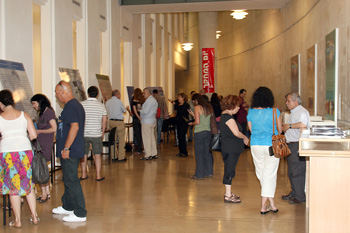| Previous issues | Subscribe |
| IN CELEBRATION |
|---|
|
|
| FROM THE PRESIDENT'S DESK |
|---|
|
|
| RESEARCH |
|---|
|
|
|
|
|
|
|
|
|
|
| TECHNOLOGY |
|---|
| INTERNATIONAL |
|---|
| CONFERENCES |
|---|
| ON THE BOOKSHELF |
|---|
|
|
| RESEARCH |
|---|
26 Research Topics at Research Day
This year's Research Day introduced a new format: Ted Talks. Seven lectures, seven minutes apiece, given by seven lecturers. 26 Topics. The focus: "All About Behavior." The results: informative and engaging. This year's Research Day, sponsored by the Open University's Research Authority, displayed 26 different research projects, which are being undertaken by University senior faculty and academic teaching staff. Focusing on the subject of "Behavior" the day-long program highlighted seven different projects. Ted Talks#1: Patriots, Humanists, Traitors or Egoists? Are individuals who refuse to serve in the military humanists or egoists? Are individuals who reveal national secrets patriots or traitors? Prof. Sonia Roccas of the University's Department of Education and Psychology in cooperation with Prof. Lilach Sagiv and Dr. Adi Amit from the School of Business Administration at The Hebrew University of Jerusalem examined these individuals' motivations and found that they divided into two separate and distinct groups: those with complex identities vs. those with simple identities.#2: Online Profiles: Truth or Fantasy? Can you believe online profiles in online dating sites? Dr. Avner Caspi of the University's Department of Education and Psychology looks into what makes some online profiles more attractive or less so, and who is more inclined to "change" the actual characteristics. The results are fascinating, yet a bit unsettling. #3: A Novel, Natural Way to Cope with Stress. Dr. Ravid Doron of the University's Department of Education and Psychology working in cooperation with Roni Yaffee and Inbal Marom of the Department of Behavioral Science at The Academic College of Tel Aviv-Yaffo, are moving closer to completing their research project on using herbal medicines for treating one of modern society's most prevalent disorder: stress. #4: How the Central Banks Explained the World Crisis. How did the two most powerful central banks in the world -- the American Federal Reserve and the European Central Bank -- explain the economic crisis to the public at large? And how did their explanations reveal or not reveal the real causal events that led up to the crisis? Dr. Zeev Rosenhak of the University's Department of Sociology, Political Science and Communication examines the communications of these central banks and whether they challenged dominant policy or will have an impact on institutional change. #5: Israeli Political Behavior: Unique Characteristics. Prof. Tamar Hermann and Yuval Lebel of the University's Department of Sociology, Political Science and Communication examine the gaps between public support for various political values and the actual political modes of conduct and how they measure up against other social behaviors. The researchers use the democracy index and the peace index survey as base lines. #6: Audience Responsiveness on Social Networking Sites. What is the relationship between specific computer-mediated communication cues on social network sites, such as Facebook, LinkedIn and Twitter and the number of "likes" that corporate Facebook postings receive. After all, one of the main measures of success of these conversational efforts is audience responsiveness. Dr. Yoram M. Kalman of the University's Department of Management and Economics, working in cooperation with Dr. Darren Gergle of the Collaborative Technology Laboratory of Northwestern University, offers some preliminary results regarding the relationship between computer mediated communication and the number of "comments' or 'likes' that corporate Facebook postings receive. #7: Redefining Organizational Commitment. In the past, organizations rewarded commitment through financial (raises or bonuses) or organizational (promotions) incentives. Today, commitment to an organization is viewed not as an asset, but more often as a burden. And, as such, organizational commitment demands a new definition. Dr. Aviad Bar-Haim of the Department of Management and Economics explains this phenomenon and offers some insights. Research Day at the Open University also included posters on research projects and opportunities to personally meet with the research teams involved, including: Development of Methods for In-Situ Monitoring of Nanoparticle Formulation in Reactive Flow: Dr. Igor Rahinov of the Open University's Avinoam Adam Department of Natural Sciences. Development of Novel Immunotherapies for Myasthenia Gravis: Prof. Miriam Souroujon of the Avinoam Adam Department of Natural Sciences.
Page: 1 2
|
